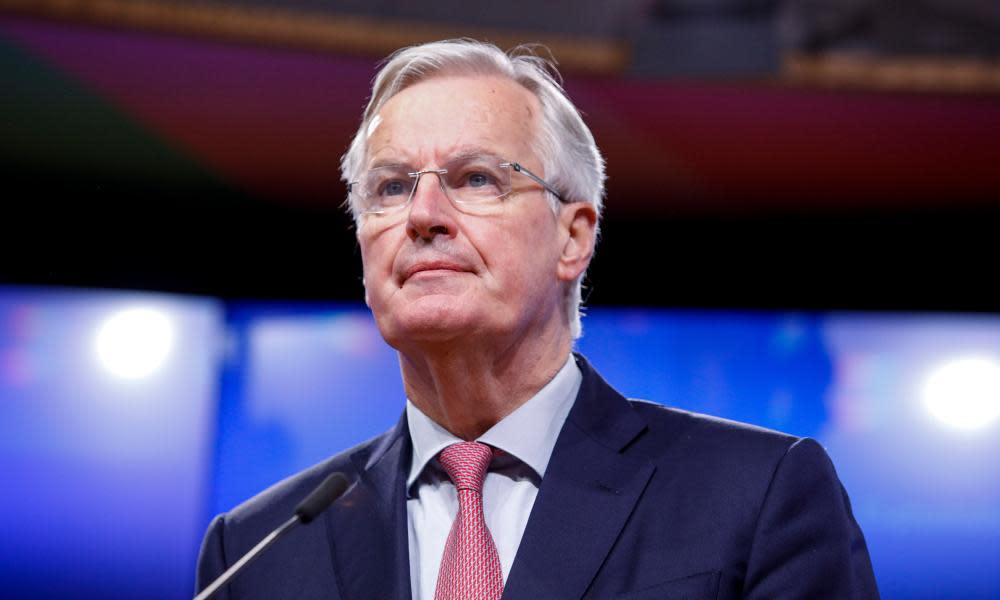Brexit transition could be extended to 2022, says Barnier

Europe’s chief Brexit negotiator, Michel Barnier, has raised the prospect of the UK remaining under EU control until the end of 2022, a proposal that would cost billions and infuriate Tory Brexiters.
At a special meeting with ambassadors from the EU’s 27 member states, Barnier floated the prospect of extending the Brexit transition until the end of 2022. His idea would allow an extra two years to negotiate a trading relationship, but means the UK would continue to follow EU rules and pay into its budget with no say for six and a half years after the 2016 vote to leave.
Both sides have already agreed a transition period of 21 months, until the end of 2020, as well as the chance to extend once by mutual consent. The length of the extension is still to be finalised by negotiators.
The transition period, which the British government prefers to call the implementation period, would see the UK following all EU laws and European court of justice rulings, while having no ministers or MEPs in the EU decision-making process.
Theresa May has previously suggested an extension of only a few months would be needed, but the EU is still waiting on the UK to make a formal proposal.
Negotiations between the EU and UK were continuing on Sunday as Brexit talks entered a critical final week, ahead of a special summit on 25 November when both sides hope to seal the deal.
Will the proposal solve anything?
The mooted extension to the transition period is a new idea being put forward by the EU to help Theresa May square the circle created by the written agreement last December and the draft withdrawal agreement in March.
That committed the UK and the EU to ensuring there was no divergence between Northern Ireland and the Republic of Ireland.
But it also, after an intervention by the Democratic Unionist party, committed the UK (not the EU) not to have any trading differences between Northern Ireland and Great Britain.
The problem is that these are two irreconcilable agreements. They also impinge on the legally binding Good Friday agreement, which brought peace to Northern Ireland and in some senses pooled sovereignty of Northern Ireland giving people a birthright to be Irish or British or both.
If the UK leaves the EU along with the customs union and the single market then the border in Ireland becomes the only land border between the UK and the EU forcing customs, tax and regulatory controls.
The backstop is one of three options agreed by the EU and the UK in December and would only come into play if option A (overall agreement) or option B (a tailor-made solution) cannot be agreed by the end of transition. The Irish have likened it to an insurance policy.
The new EU idea is to extend the transition period to allow time to get to option A or B.
But an extension is problematic for Brexiters and leave voters, who want the UK to get out of the EU as soon as possible.
The Irish and the EU will also still need the backstop in the withdrawal agreement, which must be signed before the business of the trade deal can get under way. Otherwise it is a no-deal Brexit.
Extending the transition into 2021 would mean another year of paying into the EU budget. Britain would have to negotiate this but it has been estimated at anywhere between £10bn and £17bn.
Staying in the EU for another year would also mean continued freedom of movement and being under the European court of justice, which Brexiters would oppose.
While Westminster remains in political turmoil, with leading Brexiters angling to send the prime minister back to Brussels to renegotiate the 585-page withdrawal treaty, the EU regards the text as finalised.
European leaders have zero appetite to reopen talks, despite some unhappiness about the customs union being offered to the UK as an insurance plan to avoid a hard border on the island of Ireland. “While certain member states would certainly like to see more, they have to swallow it for now,” one diplomat said.
The ambassadors did not discuss the cost of a transition extension – the UK’s net contribution to the EU budget was £9.6bn in 2016, but would have been £14.5bn without the rebate. The EU has previously said the UK would no longer be entitled to the rebate after 2020.
At the meeting, Spain voiced unhappiness about the status of Gibraltar, but EU sources were not expecting Madrid to stand in the way of an agreement. Spain has publicly welcomed the deal on Gibraltar, but its minority government is under pressure from opposition parties over the status of the dependency.
Instead, EU member states are focusing their attention on the statement on future relations, a political declaration that is expected to be released on Tuesday. France is taking a strict approach to avoid any watering down of the EU’s four freedoms, while economically liberal countries, such as the Netherlands and the Baltic states, are looking for a more ambitious text.
Ministers from EU27 will meet in Brussels on Monday to give further input into the document, which is due to be signed off at the Brexit summit next Sunday.
May said she would be travelling to Brussels to meet the European commission president, Jean-Claude Juncker, this week, but her announcement has not been confirmed in Brussels. “President Juncker is of course ready to meet PM May once the negotiations on the political declaration have advanced in a decisive manner,” a commission spokesman said. “Work on this is ongoing between the negotiators,” he said, adding it was “too early to say when a meeting could take place”.

 Yahoo News
Yahoo News 
